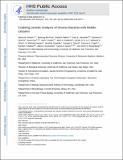Enabling genetic analysis of diverse bacteria with Mobile-CRISPRi
Author(s)
Peters, Jason M.; Koo, Byoung-Mo; Patino, Ramiro; Heussler, Gary E.; Hearne, Cameron C.; Qu, Jiuxin; Inclan, Yuki F.; Hawkins, John S.; Lu, Candy H. S.; Silvis, Melanie R.; Harden, M. Michael; Osadnik, Hendrik; Peters, Joseph E.; Engel, Joanne N.; Dutton, Rachel J.; Grossman, Alan Davis; Gross, Carol A.; Rosenberg, Oren S.; ... Show more Show less
DownloadAccepted version (702.2Kb)
Terms of use
Metadata
Show full item recordAbstract
The vast majority of bacteria, including human pathogens and microbiome species, lack genetic tools needed to systematically associate genes with phenotypes. This is the major impediment to understanding the fundamental contributions of genes and gene networks to bacterial physiology and human health. Clustered regularly interspaced short palindromic repeats interference (CRISPRi), a versatile method of blocking gene expression using a catalytically inactive Cas9 protein (dCas9) and programmable single guide RNAs, has emerged as a powerful genetic tool to dissect the functions of essential and non-essential genes in species ranging from bacteria to humans 1–6 . However, the difficulty of establishing effective CRISPRi systems across bacteria is a major barrier to its widespread use to dissect bacterial gene function. Here, we establish ‘Mobile-CRISPRi’, a suite of CRISPRi systems that combines modularity, stable genomic integration and ease of transfer to diverse bacteria by conjugation. Focusing predominantly on human pathogens associated with antibiotic resistance, we demonstrate the efficacy of Mobile-CRISPRi in gammaproteobacteria and Bacillales Firmicutes at the individual gene scale, by examining drug–gene synergies, and at the library scale, by systematically phenotyping conditionally essential genes involved in amino acid biosynthesis. Mobile-CRISPRi enables genetic dissection of non-model bacteria, facilitating analyses of microbiome function, antibiotic resistances and sensitivities, and comprehensive screens for host–microorganism interactions.
Date issued
2019-01Department
Massachusetts Institute of Technology. Department of BiologyJournal
Nature Microbiology
Publisher
Springer Science and Business Media LLC
Citation
Peters, Jason M. et al. "Enabling genetic analysis of diverse bacteria with Mobile-CRISPRi." Nature Microbiology 4 (January 2019): 244–250 © 2019 The Author(s)
Version: Author's final manuscript
ISSN
2058-5276